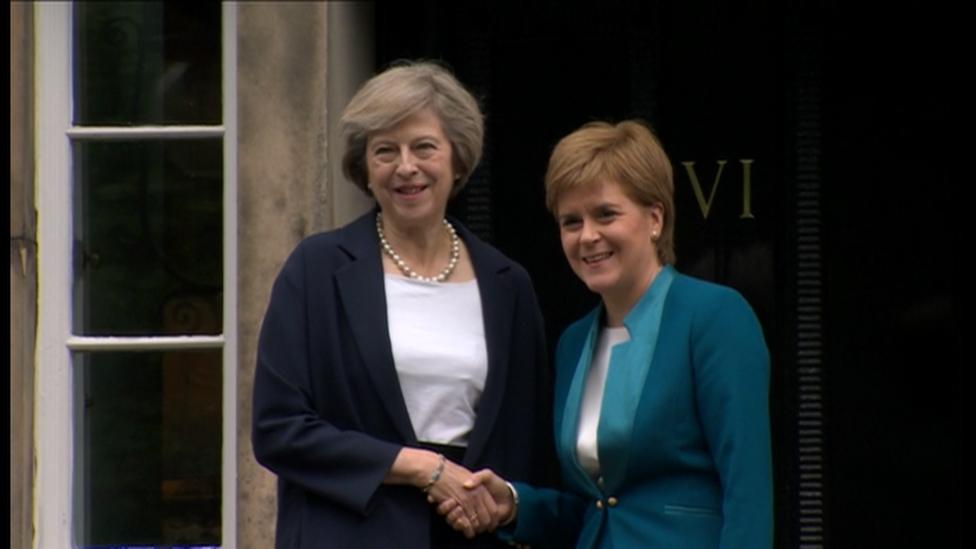Will the PM allow indyref2?
- Published

Theresa May's speech to the Scottish Conservative conference last week - on the benefits of being part of the UK - sounded in part like a referendum campaign pitch.
But we're not quite there yet. It should become clearer in the coming weeks if the Scottish government are going to push for another vote on independence.
If they do, it's widely accepted they will need to obtain permission from Westminster - under Section 30 of the Scotland Act.
That's what happened in 2014 when David Cameron and Alex Salmond signed the Edinburgh Agreement.
It's clear the UK government doesn't want another referendum. It argues the question has already been asked; Scotland has already answered.
But what happens if the Scottish Parliament disagrees? (The SNP may be a minority government at Holyrood, but they will almost certainly get the backing of the Greens to pass legislation backing another referendum).
'More palatable'
Sources say the UK government hasn't decided exactly what it will do if Nicola Sturgeon does call for a Section 30 order.
It will depend on what the request is.
Ministers in London are least likely to agree to an unconditional request to permanently transfer the power to hold a referendum. As one member of the government pointed out to me, that wasn't agreed by the Smith Commission on powers, which followed the 2014 vote.
What could be more palatable - emphasis on could - is a conditional transfer of the power.
Sources say there could be a negotiation process to iron out details, like the question voters will be asked and when. It could be lengthy.
Theresa May has told Nicola Sturgeon she is "willing to listen to options" on Scotland's future relationship with the European Union
But even then, Mrs May will have a lot to weigh up.
Some in the SNP - among them Mr Salmond - believe indyref2 would take place in Autumn 2018.
But that could well be a crunch period in the Brexit process, as UK ministers are focussed on trying to get a trade deal with Europe.
"It's the dominant issue for the UK government for the foreseeable future in a sense," says Professor Nicola McEwan from the Centre of Constitutional Change.
"We don't know how long the process of Brexit will take.
"Of course there is the triggering of Article 50, kick-starting a two-year negotiation process, but then there is a transition and there is an implementation. All of that will be huge."
In other words, ministers in London will have a lot of their plate already.
That pressure has led some to speculate permission for Holyrood to hold another independence vote could be conditional.
For example, the PM could grant the power to Holyrood as long as the referendum is held after Brexit talks are complete.
'Completely inconceivable'
It could be argued that waiting until after Brexit would allow the Scottish people to decide their future knowing the details of any deal with the EU.
"The system is pretty overstretched [dealing with Brexit]", says the Conservative MP Bernard Jenkins. "The idea of agreeing to another referendum of independence in Scotland on top of all this just seems to me completely inconceivable. I don't think the prime minister would agree to that."
And there's the argument Scotland has already had its say on independence.
The Scottish Conservatives argue there's no appetite to reopen the debate - and they question whether the mandate for another vote exists. The SNP is adamant its does - pointing to their manifesto which says Scotland being taken out of the EU against its will is grounds for Holyrood to have the right to hold another referendum. But if the Conservatives think there's no mandate or public desire - could they just say no?
One of the considerations in answering that will be how rejecting Holyrood's request would be perceived in Scotland. What would the reaction be to the UK government - which of course has just one MP from a Scottish seat - rejecting a formal request from the Scottish Parliament?
"I think if the Scottish Parliament has voted for a referendum then it should get one," says the SNP MP Stephen Gethins, the party's Europe spokesman. "Don't forget, the Tories got their worst election result in Scotland since 1865 - it would be a very difficult basis for them to reject any approach."
The question in the headline won't be answered until when - or if - the UK government receives a request from ministers in Edinburgh.
The answer is unlikely to be straightforward.